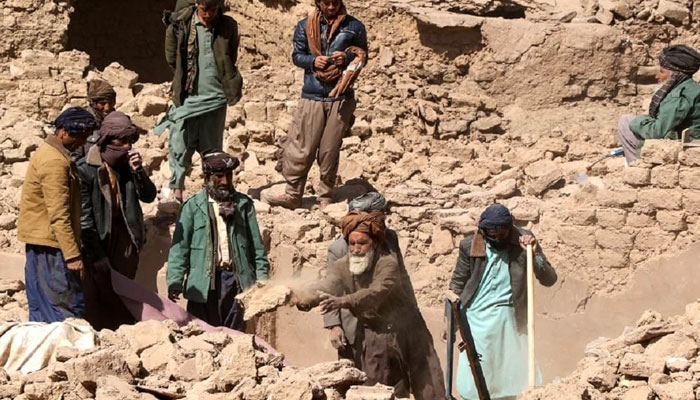Another earthquake hits Afghanistan in less than one week
Earthquake measuring 6.3 shook western parts of country
A 6.3 magnitude earthquake Wednesday struck western Afghanistan, impacting an area already suffering from a devastating loss of over 2,000 lives during a series of similar quakes last weekend.
The jolts, which took place at a shallow depth around 05:10 am local time, had its epicentre located approximately 29 kilometres towards the north of the country's Herat province, AFP reported quoting the United States Geological Survey.
Rescue teams and volunteers have been working on the ground since Saturday to locate the quake's survivors, which shook the province earlier, demolishing entire villages and affecting 12,000 people, the United Nations (UN) estimated.
Local and national officials have given conflicting counts of the number of dead and injured from the previous earthquakes, but the disaster ministry has said 2,053 people died.
"We can't give exact numbers for dead and wounded as it is in flux," said disaster management ministry spokesman Mullah Janan Sayeq.
There were no immediate reports of new casualties after Wednesday's quake, which hit near Herat city, home to more than half a million people.
The earlier earthquakes completely destroyed at least 11 villages in Herat province's Zenda Jan district, according to the United Nations.
"Not a single house is left, not even a room where we could stay at night," said 40-year-old Mohammad Naeem, who told AFP he lost 12 relatives, including his mother, after Saturday's earthquakes.
"We can't live here anymore. You can see, our family got martyred here. How could we live here?"
Local media reported that many Herat residents had been spending their nights living in tents in the open air due to a fear of aftershocks following the weekend tremors.
Providing shelter on a large scale will be a challenge for Afghanistan's Taliban authorities, who seized power in August 2021, and have fractious relations with international aid organisations.
Afghanistan is frequently hit by deadly earthquakes, but the weekend disaster was the worst to strike the war-ravaged country in more than 25 years.
Most homes in rural Afghanistan are made of mud and built around wooden support poles, with little in the way of steel or concrete reinforcement.
Multi-generational extended families generally live under the same roof, meaning serious earthquakes can devastate communities.
Afghanistan is already suffering a dire humanitarian crisis, with the widespread withdrawal of foreign aid. Meanwhile, the Herat province, on the border with Iran, is home to around 1.9 million people, and its rural communities have been suffering from a years-long drought.
— Additional input by AFP
-
New EU strategy aims to curb threat of malicious drones
-
Nancy Guthrie abduction: Piers Morgan reacts to 'massive breakthrough' in baffling case
-
Texas father guns down daughter after heated Trump argument
-
FAA shuts down El Paso Airport, flights suspended for 10 days: Here’s why
-
Teacher abused children worldwide for 55 years, kept USB log of assaults
-
Savannah Guthrie expresses fresh hope as person detained for questioning over kidnapping of Nancy
-
Tumbler Ridge school shooting among Canada’s deadliest — Here’s where it ranks
-
Suspect detained as authorities probe Nancy Guthrie’s abduction












